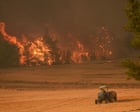
In recent days, diverse regions of the world have been navigating a complex landscape of challenges that underscore the intricate interplay between natural and human-driven crises. From devastating wildfires in Turkey to tensions in migration efforts in the Mediterranean, alongside geopolitical maneuvers in Russia and evolving security threats in the Sahel, the international community finds itself at a pivotal moment of reflection and action.
In the verdant stretches between Istanbul and Ankara in Turkey, a wildfire has claimed the lives of at least ten forest workers and rescuers. The blaze, fueled by high temperatures and strong winds, has forced the evacuation of several villages. Agricultural Minister İbrahim Yumaklı confirmed the tragic loss of five dedicated forest workers alongside five rescuers, who were working tirelessly to control the flames near Eskişehir, a region well-known for its natural beauty and agricultural significance. As authorities continue to battle the infernos, efforts are focused on minimizing further loss and protecting evacuated communities.
Meanwhile, the Mediterranean Sea, an artery of movement and refuge, has become a focal point for humanitarian and legal discourse. In recent weeks, Italian authorities have intensified their scrutiny of NGO-operated rescue vessels. Five detentions of such vessels have occurred over the past six weeks, prompting concern among global human rights organizations. The German NGO Sea-Watch recently witnessed its rescue vessel, the Aurora, detained for 20 days on the island of Lampedusa. This vessel was involved in rescuing approximately 70 individuals found in distress in international waters, including cases of severe fuel burns and dehydration. Campaigners express apprehension that these regulatory actions could exacerbate the risks to human life on this perilous route, often described as a lifeline for those fleeing conflict and poverty.
On a different front, in the Sahel region, the dynamics of security and insurgency continue to evolve. There is a growing concern regarding the use of drones by militant groups. Al-Qaida’s Sahel branch, particularly active in Mali and Burkina Faso, has reportedly developed the capability to deploy cost-effective armed drones. This technological acquisition has contributed to significant challenges for national defense forces, leading to considerable military losses. Efforts are ongoing to counteract this emerging threat through regional cooperation and the strengthening of local security protocols.
In Russia, the geopolitical landscape is shifting as the Kremlin reinforces strategies to retain military recruits. Facing potential shortfalls in troop numbers, the Russian government has implemented stricter border controls. The Federal Security Service (FSB) is now involved in preventing those summoned for military service from leaving the country, whether by air or at land borders. This development highlights the ongoing tensions within the region, as Russia seeks to maintain its defense capabilities amid international scrutiny.
Each of these unfolding stories, while located in disparate parts of the world, reflects a shared reality of managing crises that impact communities and countries alike. They call for informed discourse and international collaboration, bringing to the forefront the collective responsibility of moving toward solutions that prioritize human lives and security. As these events continue to evolve, they serve as poignant reminders of resilience and the enduring need for thoughtful engagement and coordinated effort in addressing the multitude of challenges that our world faces today.
Source: {link}
